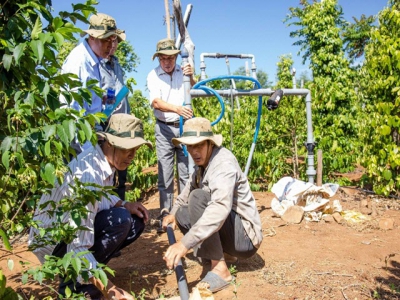Bayer launches Velum solution helping farmers battle nematodes and maximise crop yields

Bayer launches innovative integrated pest management to help farmers deal with the current challenges on nematode infestation.
Drip irrigation systems enable farmers to apply Velum in a more targeted way
Recently, Bayer has announced the launch of Velum Prime 400SC (referred to as Velum), a suspension concentrated nematicide for the control of nematodes in coffee, pepper, and cabbage. Velum Prime 400 SC is the first nematicide that selectively inhibits the nematode’s generation of cellular energy. It offers growers effective nematode protection that helps sustain plant vigour and maximise crop yield potential.
“As a leading innovative company in our industry, we are committed to developing next-generation integrated pest management (IPM) tools to help farmers control pests on their crops effectively and thereby secure yields. With novel modes of action and favourable ecological characteristics, Velum is an innovative solution that can help Vietnamese farmers reduce nematode infestation significantly on various crops,” said Weraphon Charoenpanit, country commercial lead of the Crop Science Division of Bayer Vietnam.

Velum helps farmers to protect agricultural crops from plant parasitic nematodes whilst having the least possible impact on the environment
Nematodes are mostly colourless roundworms that require a sufficiently humid environment to survive and are usually harmful during the rainy season and spread by water. Globally, there are more than 25,000 different types, some 4,000 of which are harmful to plants. Around the world, nematodes are responsible for damage exceeding $100 billion every year. Nematode infestation is widespread in Vietnam, affecting various crops and many areas and bringing a hugely negative impact on pest management, crop yields, and quality.
The roots of coffees, peppers, and vegetables are an attractive source of nutrients for pests like nematodes. Infested roots become distorted and develop rounded or irregular galls, damaged, severely affected plants appearing discoloured, lacking vigour, and wilting under stress. In addition, the nematodes also exacerbate the deleterious effects of pathogenic bacteria and fungi. Therefore, it is necessary to use nematicides to treat nematodes early to keep the roots strong and help increase crop yields.
Agriculture is one of the most important economic sectors in the country. The export of many high-value agricultural products such as coffee and pepper, among others, has helped Vietnam to be one of the world's leading agricultural exporters. However, climate change is becoming more serious, leading to the emergence of many diseases, including nematodes, affecting crop yields and quality.
Recent trials of Velum have demonstrated consistent yield and quality increases and reduction in plant-parasitic nematodes in coffee, pepper, and cabbage, among others. Velum creates a living barrier of protection around the young root and limits the chance that the nematodes reach them and cause damage. Furthermore, plants thrive better over the entire growing season and are generally more resistant to stress factors such as heat or drought and give better yield.
Dr Pham Cong Tri, representative of the Western Highlands Agriculture and Forestry Science Institute (WASI) shared: “One of the biggest challenges Vietnamese farmers facing today is to protect agricultural crops from plant-parasitic nematodes whilst having the least possible impact on the environment. Modern treatment will help farmers to effectively control nematodes and will become the cornerstone of IPM strategies for many crops. The use of Velum in low doses, prolonged and applicable to many crops will definitely be environmentally friendly and brings sustainable profits for farmers while boosting yield and quality serving both local and export demands. Besides, if soil elements are beneficial to nematode existence and damage, growers should treat the soil with nematicides twice a year at the beginning and middle of the annual rainy season to reduce crop losses."
According to Dr. Phạm Cong Tri, if soil elements are beneficial to nematode existence and damage, growers should treat the soil with nematicides twice a year at the beginning and middle of the annual rainy season to reduce crop losses.
Many growers have experienced Bayer’s new technology in numerous field trials. Actual results have shown that the Velum solution eliminates old nematode active ingredients, suitable for root/drip irrigation. On light loam, Velum is evenly distributed on topsoil while other treatments either do not move to the deep root zone or actually move away from the root zone.
Velum is available in 100ml and 250ml bottles, easy to apply, with minimal use restrictions. On top of that, the solution is the only one in the market which belongs to the GHS5 group, meeting the standards of the plant protection industry for fruit and vegetable crops. This is also an important factor to meet the export standards of international markets.
“The drastic increase in crop losses and the degradation of soil health is a major concern for many farmers every year, forcing them to use any available nematicides in order to protect the crops. However, due to regulatory pressure and growing demand for high quality and nutritious food, environmentally friendly nematicides are the most preferred and are gaining huge demand for improving soil health. Bayer, with its innovative Velum solution, is helping Vietnamese farmers grow food more sustainably, therefore contributing to increasing crop yield and quality for local food consumption as well as increasing Vietnam’s agriculture product export value,” added Weraphon Charoenpanit..
Related news
 Sliced cassava exports increase sharply
Sliced cassava exports increase sharply In the first four months of this year, sliced cassava exports were estimated at 294,000 tons, worth $65 million, up 48 percent in volume and 63 percent
 Viet Nam cashew industry fails to meet export targets
Viet Nam cashew industry fails to meet export targets The cashew industry had just overcome the crisis in late 2018 and early 2019 when it was dealt another blow from Covid-19.
 Pepper prices remain low despite undergoing slight increase
Pepper prices remain low despite undergoing slight increase Despite experiencing an upward trend in recent weeks, pepper prices in the Central Highlands and the southern region have remained low in comparison